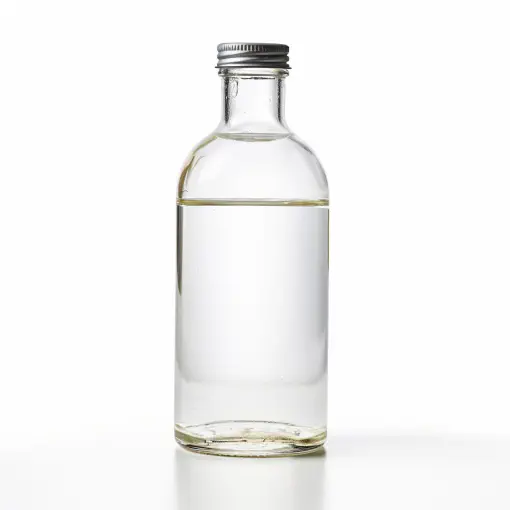Mineral oil, also known as liquid paraffin or white oil, is a transparent, colorless, odorless, and tasteless liquid derived from petroleum. Here are some physical features and properties of mineral oil:
Characteristics
-
Appearance:
Mineral oil is a clear, viscous liquid that can range in thickness from light and low viscosity to more heavy and viscous forms.
-
Density:
The density of mineral oil typically ranges from 0.8 to 0.9 grams per cubic centimeter (g/cm³). It is less dense than water, which means it floats on top of it.
-
Boiling Point:
The boiling point of mineral oil depends on its specific grade and composition. However, it generally has a relatively high boiling point, typically ranging from 300 to 400 degrees Celsius.
-
Viscosity:
Mineral oil exhibits a wide range of viscosity depending on its grade. It can range from low-viscosity oils used in lubrication to more viscous forms used in applications like transformer oil. The viscosity can also vary with temperature.
-
Solubility:
Mineral oil is immiscible with water, meaning it does not dissolve in water. However, it is soluble in hydrocarbon solvents and some organic solvents.
-
Stability:
Mineral oil is chemically stable, meaning it has a low reactivity with other substances. It is resistant to oxidation and does not readily react with most chemicals.
-
Insulating Properties:
Mineral oil has excellent electrical insulating properties and is commonly used as a coolant and insulating fluid in transformers, capacitors, and other electrical equipment.
-
Lubrication:
Mineral oil is widely used as a lubricant due to its low volatility and good thermal stability. It reduces friction between moving parts, protects against wear and corrosion, and helps dissipate heat generated during operation.
-
Moisture Barrier:
Mineral oil forms a protective barrier on surfaces, making it useful in applications where moisture protection is required, such as rust prevention and sealing wooden surfaces.
-
Pharmaceutical and Personal Care:
High-quality, pharmaceutical-grade mineral oil is used in various medical and personal care products such as laxatives, baby oils, and skin emollients.
It’s important to note that while mineral oil has a wide range of applications, it should be used as directed for each specific use case to ensure safety and effectiveness.
Applications
White oil, also known as liquid paraffin or mineral oil, has various industrial applications due to its unique properties. Here are some common industrial applications of white oil:
-
Pharmaceuticals:
White oil is commonly used in the pharmaceutical industry for various purposes. It is used as a lubricant in tablet and capsule manufacturing to facilitate smooth ejection from molds and prevent sticking. It is also used as an ingredient in creams, ointments, and lotions, providing emollient and moisturizing properties.
-
Cosmetics and Personal Care Products:
White oil is widely used in the formulation of cosmetics and personal care products. It is used in skincare products such as creams, lotions, and moisturizers to provide emollient and moisturizing effects. It can also be found in hair care products like shampoos, conditioners, and hair oils.
-
Food Processing:
White oil plays a vital role in food processing and packaging. It is commonly used as a lubricant for processing equipment in the food industry, preventing sticking and ensuring smooth operations. It is also used as a release agent in baking, providing a non-stick surface for products like bread, cakes, and pastries. Additionally, it is used as a coating on fresh produce and fruits to extend their shelf life and maintain quality.
-
Textile Industry:
White oil finds applications in the textile industry, primarily for lubrication and protection of machinery. It is used in sewing machine oils, knitting lubricants, and loom oils to reduce friction between machine parts and enhance the overall efficiency of textile manufacturing processes.
-
Rubber and Plastics:
In the rubber and plastics industries, white oil is used as a lubricant and plasticizer. It helps improve the flow properties of rubber compounds during processing, enhances mold release, and ensures smooth extrusion. It can also be used as a plasticizer to increase flexibility and improve the processing of polymers and plastics.
-
Metalworking and Machinery:
White oil is used in metalworking and machinery applications as a lubricant and rust preventive. It forms a protective film on metal surfaces, reducing friction, preventing wear, and protecting against corrosion.
-
Adhesives and Sealants:
White oil is used as a softening and plasticizing agent in the production of adhesives and sealants. It helps improve flexibility, adhesive properties, and workability of the final products.
-
Electrical and Electronic Industry:
White oil is utilized as a coolant and insulating fluid in electrical transformers, capacitors, and other electrical equipment. Its excellent dielectric properties help dissipate heat and prevent electrical breakdown.
These are just a few examples of the industrial applications of white oil. Its versatility, stability, and lubricating properties make it a valuable ingredient in various industries.
